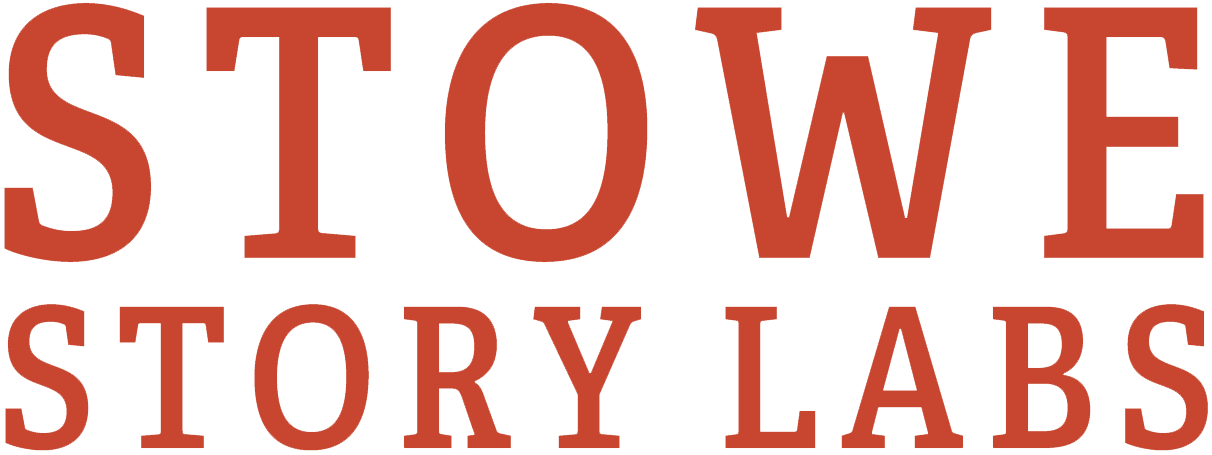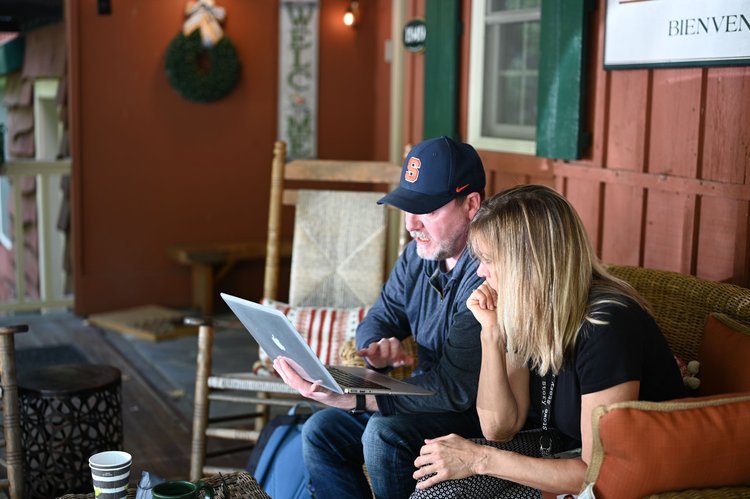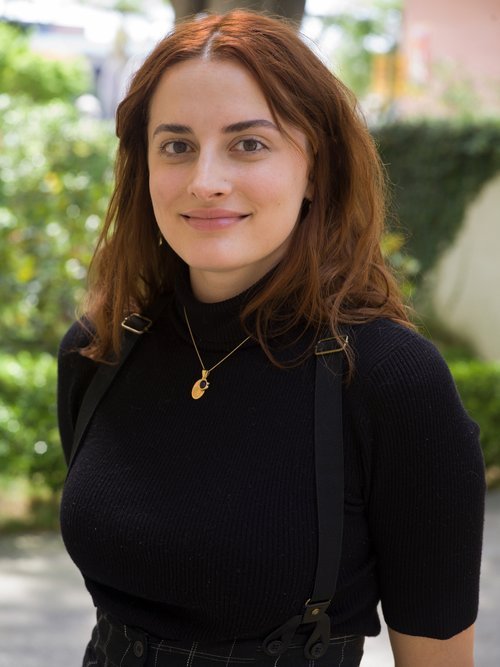Labs Got Soul
Chris Millis on Ten Years of Mentoring with Stowe Story Labs
By Marian Cook
Chris Millis mentoring at 2021 September Retreat
Stowe Story Labs mentor Chris Millis has been working with Stowe for ten years. The number of participants he’s mentored, projects he’s helped shape, filmmakers he’s encouraged–the number is untold. What keeps him coming back?
“It's the spirit of the shared experience. It's hard to explain to people who haven't experienced it, but it just feeds the soul. It excites me about my own work when I go home because we're colleagues–it's not a teacher-student dynamic. We're really helping each other out and building a community. It's just so respectful. There's joy. It's got a soul–the Labs have a soul.”
Chris Millis is part of that beating soul, and he imbues it with his eclectic–and sometimes satirical–background. He began as a political cartoonist.
“Charles Schultz, you know, who did Peanuts? He said that he was a cartoonist because he wasn't a good enough writer to be a writer. And he wasn't a good enough artist to be an artist. But he was just good enough at both to be a cartoonist. So, that's how I started out,” Chris says with a chuckle.
Then he switched to a different paper where he got assigned to write sports columns. That was the only professional writing he’d ever done up until then–unless you count the humor columns he wrote in college. That gave him the courage to enter the international 3-Day Novel Contest in 2000 and from there it snowballed: he won, his novel got published, it was optioned, he was asked to adapt the screenplay, and then it was directed by Jonas Åkerlund starring Matt Lucas, Johnny Knoxville, Billy Joel, James Caan, Rebel Wilson–a whole slew of talent, some of who were up-and-coming then but established now. It’s titled Small Apartments, a dark comedy about a man who is surrounded by strange events and odd neighbors.
“It was my first time doing all that stuff. So I started reading a bunch of screenplays. I actually ended up landing on Sideways–I used it to teach me formatting, which was a good choice because it wound up winning Best Screenplay at the Oscars that year. I watched a lot of movies and would outline them – by hand – on legal pads. I would just pause the movie and learn how to write slugs and little summaries of what was happening in the scenes.”
Chris continued, “But I was fortunate enough that Jonas was a terrific mentor. He kept me a very integral part of the process and we've worked on other stuff together subsequently. I got lucky because with a different kind of director, I don't think I would have been as involved. And I think that would have really been difficult for me.”
Stowe Lab Participants in 2018
But the nature of a writing career is that as many highs as there are, there are lows, too. Despite having Small Apartments under his belt, an MFA from Goddard College, and representation at certain points, he still had to do a lot of hustling on his own. He couch surfed and took on an array of gigs (everything from specs to ghostwriting celebrity memoirs), and quickly realized that writing for the screen paid a lot more than fiction writing. “Just don't sit around and wait for people to validate you, your work, and your career. You can just go out and start making stuff,” Chris encourages.
Today, though, things are more stable as he teaches writing at the Savannah College of Art and Design. On the side, he continues to work on his personal projects like scripts in different phases of production (e.g., reuniting with Jonas for an adaptation of his book God & California), working on his fourth novel, trying his hand at a play, and considering the idea of a novella. Whatever it may be, he likes to do it through the lens of comedy.
“You can talk about a lot of big issues without being didactic. You can kind of sneak up on your audience and I just think things are more interesting. But the advice I always give to students about the secret to writing comedy is: don't try to be funny, that’s the worst thing you can do. Just write about people,” Chris explains.
He speaks fondly of teaching. Although it takes up a lot of his time, he loves it for the camaraderie, community, and supporting fellow artists, elements of Stowe that keep bringing him back as a mentor year-after-year.
Chris recalls, “I remember a participant one time saying, ‘I can't believe you guys eat with us.’ I hate places that are hierarchical and exclusive. It's just wonderful for me to meet colleagues who I wouldn't otherwise get an opportunity to work with and I've had a lot of good lasting friendships that have come out of the Labs.”
He’s got a lot of memories from his ten years with Stowe, but his favorite: “The discovery of Heady Topper, the beer from The Alchemist, would have to be up there,” Chris chuckles.
“No, but seriously one of my favorite parts was when the Labs were in September. For the first three or four years or so, it included my birthday. So my birthday was always part of the Labs, which was great. And then one year in particular we had like a really big celebration of something, maybe it was the five-year anniversary, but there were a lot of people there and it felt like a birthday party for me–that was always a lot of fun to me, to incorporate Stowe with my birthday every year.”
But most of all, what Chris looks so fondly on about the Labs is how it has grown. How today, the Labs are celebrating their ten year anniversary, hosting its inaugural Vermont Film + Music Festival, and offering a range of new programs (e.g., Launch, Feature Campus, Producers Lab, Writers Room, New Voices • New Mexico) compared to when David first pitched the idea of mentoring for a budding Stowe all those years ago in his kitchen.
“I'm amazed at how it's grown over the last decade. So many people have contributed in such positive ways, but obviously the heart that beats at the center of it is David Rocchio and David Pope who are just remarkable. They’ve had this vision from the beginning.”
Marian Cook is a former journalist, Stowe Story Labs staff member, and current USC student pursuing an MFA in directing. She’s been published over a dozen times, covering topics from local news to federal healthcare legislation. Although she loves the world of journalism, having done documentaries on a range of topics from plastic surgery to segregation in the church, her real passion lies in narrative film. She one day hopes to be a writer-director and tell strong, female-led stories, especially that of Latinas. When she’s not filming, she likes to explore, listen to blues and jazz, brush up on her French, and absorb everything science fiction related. Learn more at http://mariandcook.weebly.com/. At Stowe Story Labs, Marian assists with all aspects of operations, writes for the newsletter, and assists with research and writing to support fundraising and communications about programs.



